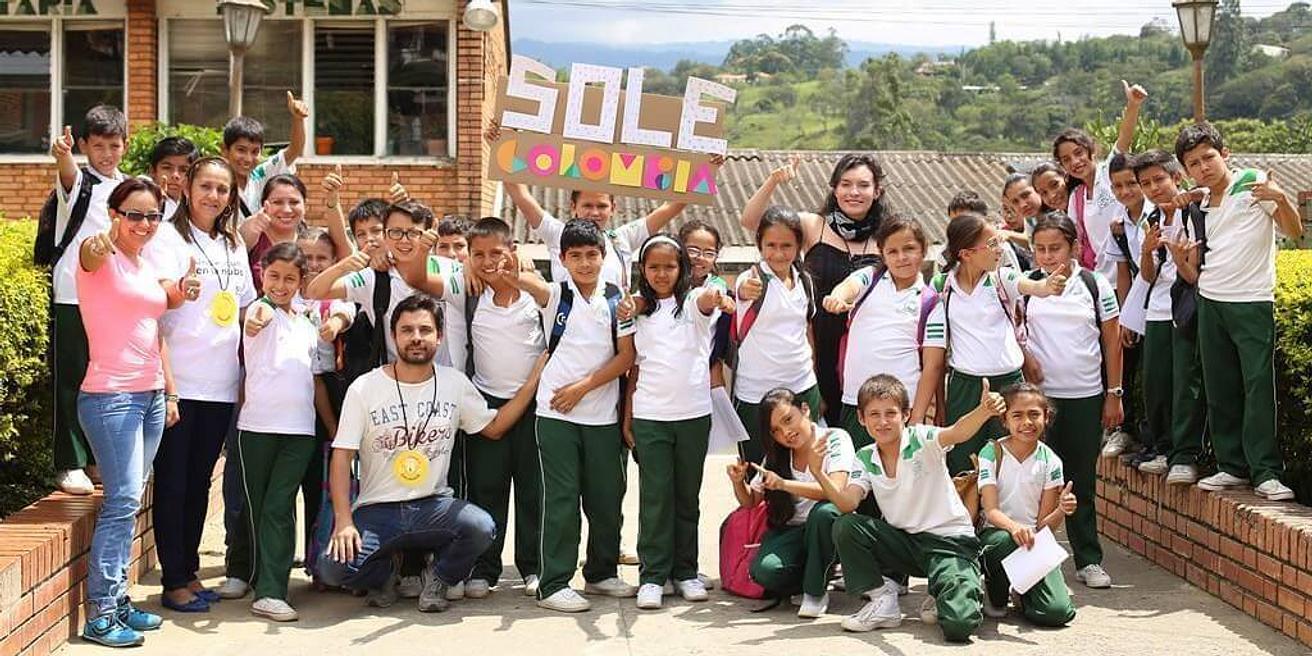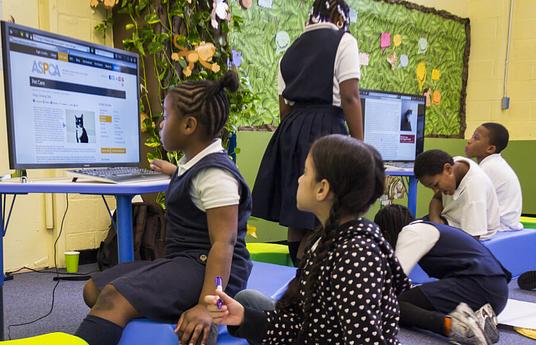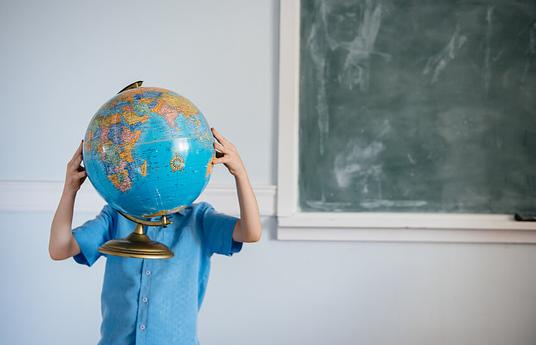If the idea of young people organizing their own learning evokes images of calamity and chaos, then you haven’t heard of SOLEs. Imagine small groups of learners excitedly conferring around a computer, eagerly researching to find answers to a big question, the kind of question that brings up a million others and has no simple solution. These learners are making connections, learning to collaborate, and enjoying their lesson, perhaps without realizing it’s a lesson at all.
Welcome to a self-organized learning environment, or SOLE. SOLEs grew from Dr. Sugata Mitra’s ‘Hole in the Wall’ experiment in New Delhi which recognized the potential for children to organize their own learning using just a computer, even with no prior experience of technology or formal education. The concept has since grown into the School in the Cloud, in which children from all backgrounds can engage and connect with information and mentoring online.
In a SOLE, small groups of children are given a big question as a provocation – ‘the spark that ignites a SOLE session’ – and left to use the internet to work together to answer it. In the process, they develop 21st-century skills like digital literacy and critical thinking, reimagine the dynamics of the classroom, and redefine the role of teacher and student.
This non-traditional learning set up is facilitated by ‘The Granny Cloud’, a global network of educators, men and women of all ages, who support learners through an online School in the Cloud platform. Currently, The Granny Cloud consists of over 100 active volunteers whose main role is to interact with groups of children in regular or one-off sessions involving a variety of activities and discussions. The aim here is to stimulate curiosity, develop confidence, build community, and generally have fun! It's all about learning how to learn, not what to learn.
What began with an ambitious goal, expressed in Dr. Mitra's now-famous TED Talk, has sparked a movement that spans continents. Hundreds of schools across the world are taking part in a global experiment in self-organized learning, to shift the education paradigm away from traditional, teacher-led classrooms towards learning experiences that prepare children to thrive in the 21st Century.
But in Colombia, it’s not only young people benefitting from this unique and ambitious approach. Entire communities are using SOLEs to help them find answers to their own big questions. Since it began in 2014, SOLE Colombia has worked with countless educators, librarians, and community leaders and formed alliances with government agencies, NGOs, companies, and academia, all with the purpose of transforming and empowering communities through new education opportunities. SOLE Colombia sees that every community space with a computer and access to the internet could become a hotspot of learning. In fact, SOLEs are already up and running in 1,400 public libraries across the country, as well as kiosks and community spaces in urban, rural and indigenous communities.
As well as being used successfully with school-aged children, the essence of self-organized learning can improve the lives of adults, too. Whereas school children might ask big questions like 'Why is the sky blue?', adults have their own big questions, like how to mitigate flooding, or how to start a small business. Villagers in remote areas of Colombia have successfully used the SOLE approach and the power of The Granny Cloud to find out how to make their plantations more efficient, for example, or to set up their own entrepreneurial projects, such as establishing a bakery or selling crafts made from recycled materials.
In what could be SOLE’s most ambitious project to date, SOLE Colombia is helping the country to answer its own big questions surrounding the peace process, by helping the government and UN to support communities in Farc areas post disarmament. Farc rebels completed their disarmament last June and SOLE Colombia saw this as a unique opportunity to utilize community-based learning to promote social cohesion and support positive change in this delicate, transitionary period. In rural and remote areas that have never known a State presence, it’s a challenge to create schools and recruit teachers for the first time, in areas where there is no guarantee they will remain. With SOLE’s experience of thinking outside of the traditional classroom, they were able to suggest a low-cost option to build skills, provide hope and make an impact.
The whole jumping off point of self-organized learning is the big question, one with no easy answer. Could there be a bigger question than how to heal social divides and start a new chapter? SOLE Colombia proposed 3 bamboo SOLE Labs in Farc camp locations, with the idea that if the communities can build and maintain the spaces themselves, they have a greater chance of being sustainable. And while elsewhere SOLE takes a more hands-off approach, SOLE Colombia is planning to guide and advise these communities for three years to ensure they can be self-sustaining in future.
Now people who have lived on the fringes of society for many years and may never have even turned on a computer before are suddenly connected to a whole world of information at their fingertips, along with a Granny from across the globe. Education has the power to transform individuals, communities and even countries. Communities no longer have to rely on school buildings, teachers, and curriculums and can be empowered to learn for themselves, by themselves, as a community. What answers will they come up with? Watch this space.
Learn more about SOLE Colombia, here. If you'd like to learn how to implement the principles of SOLE in your setting, check out the innovation page.



